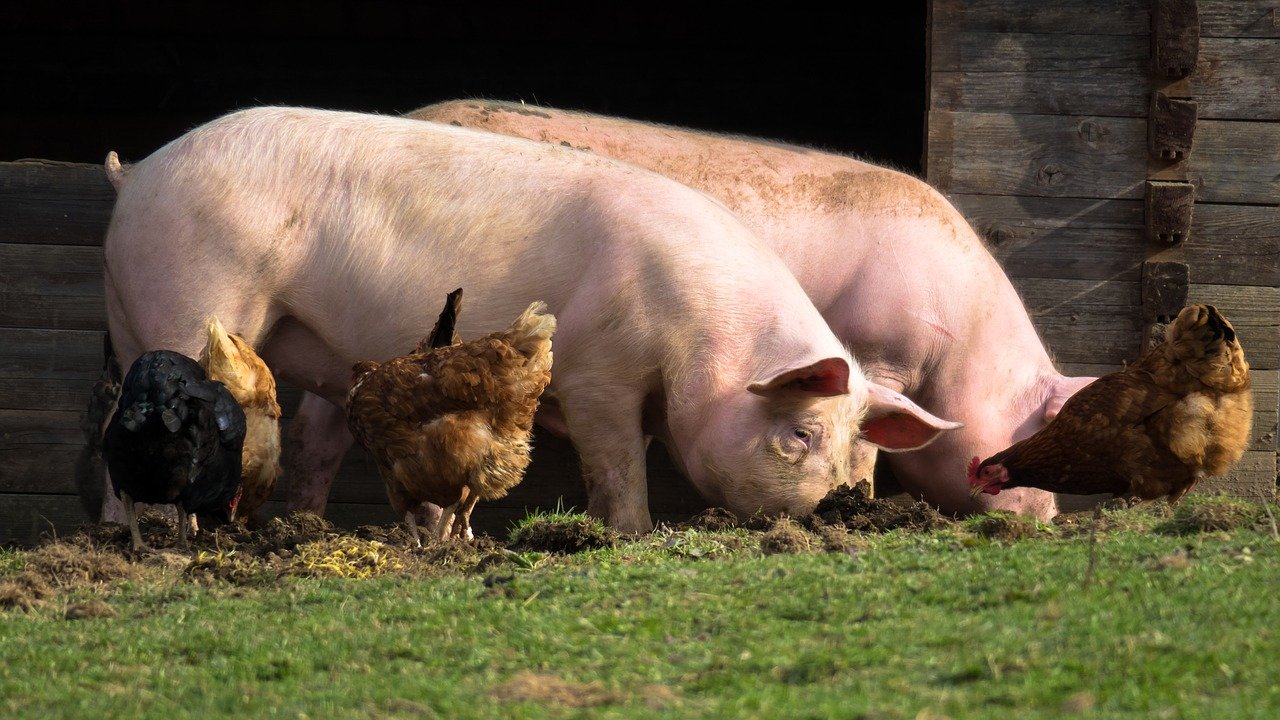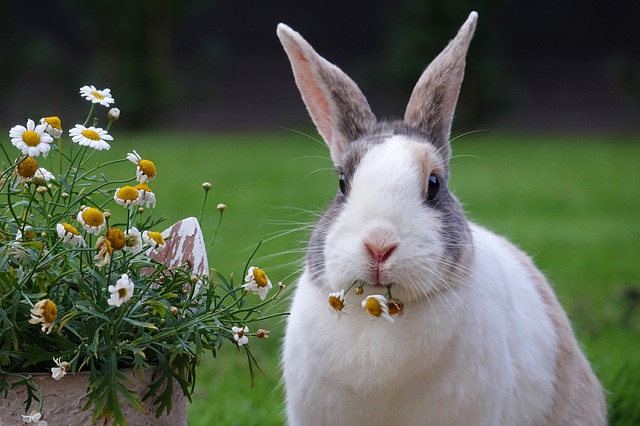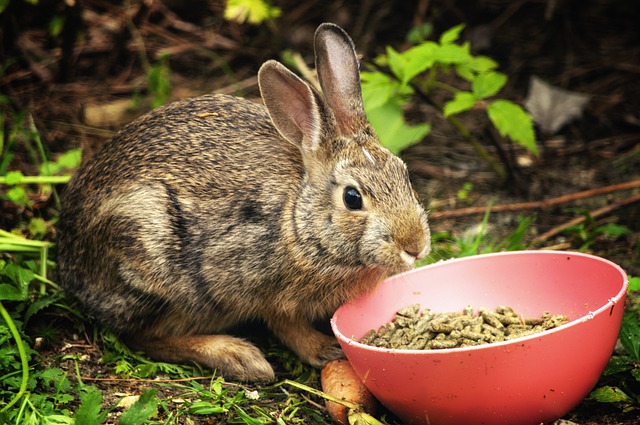Rabbits can eat different kinds of foods, from fruits, and vegetables to cooked cereals, and tuber foods.
However, not all foods in these classes are good for bunnies.
To prevent health issues in rabbits, the following rules should be followed in the rabbit feeding routine.
Make Green fodder Rabbit main Food
Green fodder, either hay, dried folder,,,, or tuber vegetables are healthy for bunnies and should be the main component of their food.
Pet dieticians advised you should feed your rabbit green food two times a day.
Weed is actually of the best rabbit foods.
This includes all wild plants (meadow plants, leaves of trees).
You can also offer vegetable greenery such as carrot green, spinach, cabbage, kohlrabi leaves, and other green leafy vegetables)
Herbs such as Sage, Coriander, Parsley, Rosemary, Mint, Oregano, Dill, etc can also be given to rabbits.
Make sure you give them food in the morning and in the evening, that’s how to treat the rabbit well.
If this feeding guide is not followed religiously, the metabolism can be slowed down and digestive issues of different forms may occur.
Rabbits that are mainly fed dry foods are often quite calm and not fit and vital.
Bladder and kidney diseases are also often the result of such a feeding regimen.
In addition to this, dental diseases can be aggravated in your rabbits.
Garden green food vs foods from the Pet shop
While rabbits love weeds and green vegetables, it is better, for example, to offer meadow plants from the garden than to buy from the supermarket.
Green fodder that’s harvested by yourself and washed properly is better compared to can foods that are often contaminated with sprays.
Moreso, organic green fodder contains higher fiber content which is very important for rabbit digestion and health.
Balanced Feeding
Green food should always be available for rabbits, you don’t just feed them green food twice a day, they need it day and night.
Also, note that most farmers offer food to their rabbits up to four times a day.
This is because rabbits do not like eating their food once but in a small ratio.
To enhance their appetite and also make the food fresh, give them a bit
By doing this, they will be able to digest the food slowly, and the better it is for them.
It helps both the digestion and the absorption of nutrients.
Uneven ingestion of foods into the digestive tract (one portion of green fodder and then again only hay etc.) often leads to digestive disorders.
This will make rabbits chew less, thereby reducing the chances of dental problems.
Similarly, when less water is absorbed in a period, the chances of urinary tract diseases can be reduced.
Dry foods should be a Supplementary
Any dried fodder, whether it is hay, dried herbs, roots, or dried vegetables, should be added to their meal as a supplement.
Note that supplementary foods should never make up a reasonable amount in their diets.
When you feed rabbits with much dry food, she’s likely to get sick.
Common problems that can be experienced are slow metabolism, digestive disorders, urinary tract diseases, overweight, among others.
Don’t be a Fan of Commercial Dry Foods
Rabbits are herbivores, therefore, they prefer fresh green leaves when allowed to be independent.
As a farmer or pet lover who rears rabbits, you can be tempted to buy only branded foods for your rabbits.
This is very true, especially if you don’t have time to prepare their food yourself.
However, most branded foods are in the dried form and the driest food in the supermarket can make rabbits get sick.
Having said that, there are still healthy dry foods you can offer our bunnies without worry, just talk to your veterinary doctor about this.
Tips for buying Dry foods for Rabbits
- Healthy dry food should have a full declaration of the contents and ingredient
- It should not have any by-products or contaminants.
- Herbs and seeds should be included in the food – possibly also a few different vegetables.
- Furthermore, no pellets (green oblong sticks) or extrudates (green or colored lumps/rings, etc.) and no wheat should be included.
- Extrudates often consists of waste products and are very unhealthy for digestion due to their structure (strongly ground – they no longer contain fibers).
- Dried foods often cause all kinds of digestive problems (including fresh food intolerances), urinary tract diseases, and dental problems.
Rabbits need Plant Substances as a compliment
Plant substances are important as a complement to their diets and it’s also good for rabbit health.
You can either feed the rabbits with a lot of green fodder from outside (meadow plants) or supplement the vegetable green fodder with dried herbs, or fresh herbs
I prefer bitter salads (endive, chicory), kitchen herbs, and vegetable greens (carrot green, celery green).
A lack of plant substances leads to digestive disorders and other diseases, for example, respiratory diseases.
Water from Bowl vs Nipple Drinker
It is proven that rabbits drink significantly more water from a bowl than from a drinker.
Therefore, they should get the water from a bowl.
In addition, they need water even in winter and when they are fed fresh food.
Otherwise, they can get urinary tract diseases.
To prevent the bowl from getting dirty, it should be placed on a stone or a floor.
You can also use water bowls from the bird’s food supply which are hung on the grating.
Offer Treats in Small amounts
Treats are nutritious and healthy, and no doubt, animals love them when given.
Unfortunately, there are many unhealthy treats in pet shops that are very harmful to the health of rabbits.
These include yogurt drops, oat cushions, nibble sticks, green rollies, etc
Just as popular but not harmful to health are pea flakes, sorghum (birds need), sunflower seeds, and fresh herbs.
Do not give just dry treats in too large quantities.
Don’t be too mean with good and bad foods for Rabbits
When you read only, many blogs list foods that are harmful to rabbits, foods that are not healthy, etc.
Of course yes, there are also tips on good and healthy foods and drinks for rabbits.
However, there are myths in some of those tips as regards healthy and unhealthy diet for rabbits
Unfortunately, farmers often do more harm than good to their rabbits when they don’t seek an expert’s opinion.
You often hear that you should not feed rabbits with wet fresh food, cabbage bloats, or foods that are produced by the industry because there are so many poisonous plants.
Some also claim that because a food is not healthy for man, it is also not healthy for rabbits or because it is poisonous to lower animals like horses, dogs, and cats, it is likewise poisonous to rabbits.
Cucumber is also claimed to cause diarrhea in some quarters.
When you are over-cautious with the rabbit diet, you’re much more likely going to feed your bunny junk and end up increasing the chances of diseases.
Change Rabbit Food gradually if you’ve to
If you’ve not been feeding your rabbits well in the past, and you want to correct it, do it gradually.
Do not change their diet too quickly, rabbits can not tolerate such sudden changes in their diet.
For example, changing from dry food to fresh food or vice versa.
If for example, you want to switch from dry foods to fresh veggies, firstly reduce the dry food to one tablespoon a day and double the amount of fresh food you give to them before.
Reduce dry food by halving the amount daily.
If the rabbits have been fed a healthy diet for several weeks, cabbage, clover, and similar plants can be fed without hesitation.









